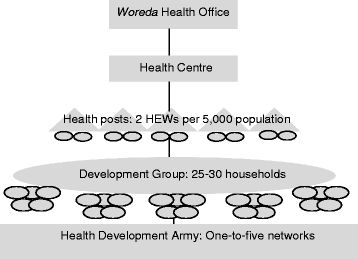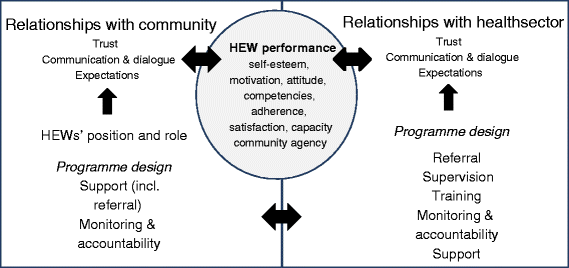A qualitative assessment of health extension workers' relationships with the community and health sector in Ethiopia: opportunities for enhancing maternal health performance
- PMID: 26423049
- PMCID: PMC4589131
- DOI: 10.1186/s12960-015-0077-4
A qualitative assessment of health extension workers' relationships with the community and health sector in Ethiopia: opportunities for enhancing maternal health performance
Abstract
Background: Health extension workers (HEWs) in Ethiopia have a unique position, connecting communities to the health sector. This intermediary position requires strong interpersonal relationships with actors in both the community and health sector, in order to enhance HEW performance. This study aimed to understand how relationships between HEWs, the community and health sector were shaped, in order to inform policy on optimizing HEW performance in providing maternal health services.
Methods: We conducted a qualitative study in six districts in the Sidama zone, which included focus group discussions (FGDs) with HEWs, women and men from the community and semi-structured interviews with HEWs; key informants working in programme management, health service delivery and supervision of HEWs; mothers; and traditional birth attendants. Respondents were asked about facilitators and barriers regarding HEWs' relationships with the community and health sector. Interviews and FGDs were recorded, transcribed, translated, coded and thematically analysed.
Results: HEWs were selected by their communities, which enhanced trust and engagement between them. Relationships were facilitated by programme design elements related to support, referral, supervision, training, monitoring and accountability. Trust, communication and dialogue and expectations influenced the strength of relationships. From the community side, the health development army supported HEWs in liaising with community members. From the health sector side, top-down supervision and inadequate training possibilities hampered relationships and demotivated HEWs. Health professionals, administrators, HEWs and communities occasionally met to monitor HEW and programme performance. Expectations from the community and health sector regarding HEWs' tasks sometimes differed, negatively affecting motivation and satisfaction of HEWs.
Conclusion: HEWs' relationships with the community and health sector can be constrained as a result of inadequate support systems, lack of trust, communication and dialogue and differing expectations. Clearly defined roles at all levels and standardized support, monitoring and accountability, referral, supervision and training, which are executed regularly with clear communication lines, could improve dialogue and trust between HEWs and actors from the community and health sector. This is important to increase HEW performance and maximize the value of HEWs' unique position.
Figures
References
-
- Admassie A, Abebaw D, Woldemichael AD. Impact evaluation of the Ethiopian Health Services Extension Programme. J Dev Effectiveness. 2009;1:430–449. doi: 10.1080/19439340903375724. - DOI
-
- Medhanyie A, Spigt M, Kifle Y, Schaay N, Sanders D, Blanco R, GeertJan D, Berhane Y. The role of health extension workers in improving utilization of maternal health services in rural areas in Ethiopia: a cross sectional study. BMC Health Serv Res. 2012;12:352. doi: 10.1186/1472-6963-12-352. - DOI - PMC - PubMed
-
- Dynes M, Buffington ST, Carpenter M, Handley A, Kelley M, Tadesse L, Beyene HT, Sibley L. Strengthening maternal and newborn health in rural Ethiopia: early results from frontline health worker community maternal and newborn health training. Midwifery. 2013;29:251–259. doi: 10.1016/j.midw.2012.01.006. - DOI - PubMed
-
- Bilal NK, Herbst CH, Zhao F, Soucat A, Lemiere C. Health extension workers in Ethiopia: Improved access and coverage for the rural poor. In Yes Africa Can: Success Stories from a Dynamic Continent. Edited by Chuhan-Pole P, Angwafo M. Washington D.C., USA: The World Bank. 2011:433-43
Publication types
MeSH terms
LinkOut - more resources
Full Text Sources
Other Literature Sources
Miscellaneous



